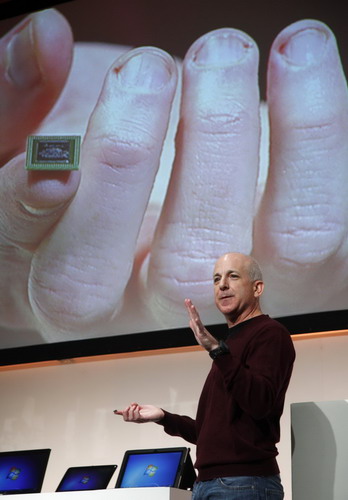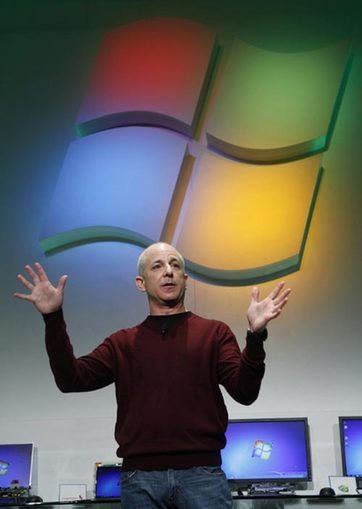Science and Health
Microsoft developing Windows for phone chips
(Agencies)
Updated: 2011-01-06 07:51
 |
Large Medium Small |
|
 Steven Sinofsky, president of Windows and Windows Live Division at Microsoft, shows an example of System on a Chip architecture on the tip of his finger, also shown on the video screen (background), as he talks about the next version of Windows running on System on a Chip (SOC) at a news briefing at the Consumer Electronics Show (CES) in Las Vegas Jan 5, 2011. [Photo/Agencies]
|
LAS VEGAS - Microsoft Corp confirmed Wednesday that it is developing a version of its main Windows operating system that will run on cell phone chips, providing an alternative for the first time to the chips based on Intel technology.
| ||||
Steve Sinofsky, president of the Windows division, demonstrated at the International Consumer Electronics Show in Las Vegas prototype computers running Windows on chips designed by ARM Holdings, a British company whose technology goes into practically all cell phone chips.
Sinofsky didn't say when the new version of Windows would be available, but intimated that it might be one or a few years away.
ARM provides the core blueprints for the chips, but doesn't make chips itself. The chips used in Wednesday's demonstration were made by Qualcomm Corp, Texas Instruments Inc. and Nvidia Corp.
A key drawback to moving to another "processor architecture" is that programs created for the current version of Windows won't work on the new chips. Peripherals like printers won't work either, without new software aides, or "drivers."
"Under the hood, there's a ton of issues to work out," Sinofsky said. He demonstrated versions of Microsoft Word, PowerPoint, Internet Explorer and Media Player running under ARM, but didn't say how third-party developers would deal with the switch. Apple navigated a switch of processor architecture in the last decade, but Microsoft's task is far larger, since it works with far more partners, both on the hardware and software sides.
The Wall Street Journal earlier reported on Microsoft's development of an ARM-based Windows version.
Microsoft already makes software called "Windows" for cell phones, but it has little in common with the software that runs on computers, and doesn't run the same programs.
 |
|
Steven Sinofsky, president of Windows and Windows Live Division at Microsoft, talks about the next version of Windows running on System on a Chip (SoC) architectures at a news briefing at the Consumer Electronics Show (CES) in Las Vegas Jan 5, 2011. [Photo/Agencies] |


